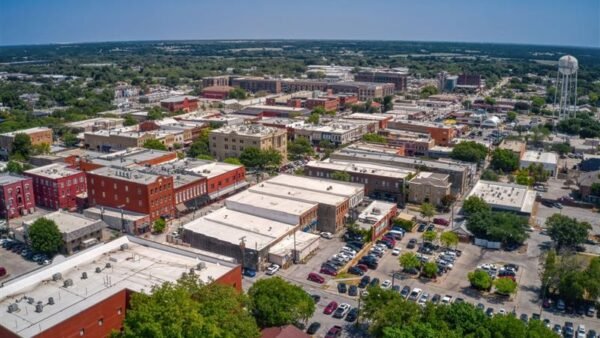At #2 with 65 points, the Austin, Texas, metro area continues to expand as a tech powerhouse by combining high-tech job and company density with the South’s third-highest growth in tech company density — a 25% increase between 2019 and 2023. Notably, by 2023, nearly 50 out of every 1,000 businesses in Austin were tech firms, driven by the presence of major players like Google, Apple, Dell, Tesla, Oracle and ABBYY. Moreover, the metro’s tech scene thrives on a diverse range of segments, including AI and green energy (bolstered by the University of Texas), as well as globally recognized events like SXSW. Thus, with tech companies accounting for more than half of all office leasing activity in 2024, Austin remains a magnet for innovation, talent and investment.
Next, the Raleigh, N.C., metro area climbed to third place, up from fourth last year, by offering a mix of high-tech job density and competitive median earnings. Here, the metro’s 78.4 tech jobs per 1,000 workers ranks as the fourth-highest in the region, while its position within the Research Triangle — anchored by North Carolina State University — drives collaboration across industries like life sciences, agritech and cleantech.
Not to be outdone, Dallas-Fort Worth moved up from sixth to fourth in this year’s rankings, driven by a 25.9% growth in tech company presence — the second-highest increase among the top 20 metros. Unlike other Southern tech hubs, Dallas has a fully diverse economy spanning energy, transportation and health care, which offers unique collaboration opportunities for tech firms. For instance, companies like iRely (which relocated to Irving, Texas) and Diversified (now in Plano, Texas) have joined homegrown successes, such as StackPath and Bestow. DFW has also managed to attract a steady stream of tech patents. Yet, despite these strengths, Dallas fell just short of the podium due to its slightly lower tech establishment density compared to Raleigh, in addition to a relatively higher cost of living.
Then, the Huntsville, Ala., metro area secured the final top-five spot, bolstered by its strong tech job and company density that’s driven by aerospace, defense and rocketry industries, alongside broader diversification. It’s worth noting here that several companies expanded or relocated to the area during the studied period: Dynetics, Torch Technologies, and Invariant Corporation contributed to a 50% increase in tech jobs between 2019 and 2023. On top of adding 4,779 positions throughout a two-year burst (2019 to 2021) and maintaining the lowest unemployment rate among the top 20 metros, Huntsville’s unique mix of high-tech innovation, government contracts and strong quality of life continues to make it one of the South’s most resilient tech hubs.
Meanwhile, in the latter half of the ranking, other metros showcased unique strengths. For instance, Houston (#9) led in tech patent output, while Virginia introduced two newcomers — Wilmington (#13), with the highest growth in tech company density, and Roanoke (#16), which saw a 200% increase in tech jobs in the last five years, including adding 2,380 tech positions in 2023 alone. Not far behind, Florida claimed five spots in the top 20 with metros like Tampa (#18) and Jacksonville (#19) near the top for tech establishment density growth and employment, respectively.





